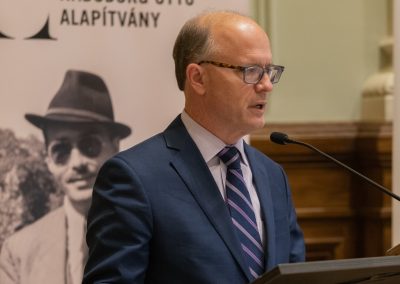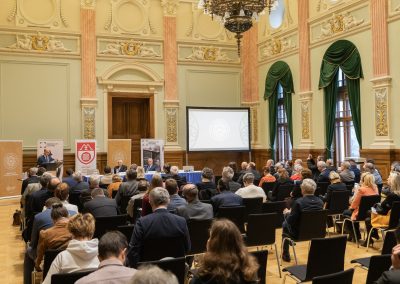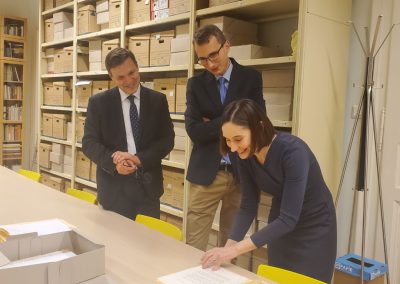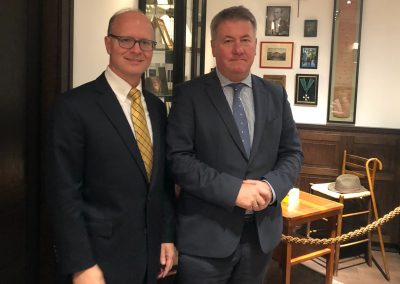Otto von Habsburg Foundation connects with the Kirk Center
In a 1959 letter to Russell Kirk, Otto von Habsburg, Archduke of Austria-Hungary, wrote: “I am very much interested to learn from your letter that you devote so much attention to the development of [the journal] ‘Modern Age.’ I think that you do here a tremendously important task, and after all, even politically speaking, the most important thing remains to convince intellectuals of the conservative idea. Since the break up of our civilisation started among the intellectuals, the recovery also can come only from these quarters. Consequently, it is decisively important to gain the intellectuals….”
The correspondence between Kirk and the Archduke spanned three decades. It is a delightful and interesting glimpse into an important international friendship which also highlights the deep concern both felt for the weakened foundations of the West’s common Christian civilization. Kirk and the Archduke both embodied the spirit of the gentleman and were dedicated champions of ordered liberty. They are exemplars for us today as much as ever.
This correspondence recently came to light when the Otto von Habsburg Foundation, which manages the archival collection and intellectual heritage of its namesake, began to prepare for a conference marking the 110th birthday of the Archduke. The Foundation chose the topic “Conservative Minds: The Legacy of Otto von Habsburg and Other Conservative Thinkers from a Transatlantic Perspective” for the conference held in Budapest on November 19-20, 2022. The event was focused on engaging prominent American figures of the American conservative intellectual movement and European writers and statesmen.
The Otto von Habsburg Foundation’s director, Gergely Prőhle, a former diplomat turned ideas entrepreneur, was so impressed with the Kirk-Habsburg letters that he reached out to the Russell Kirk Center and invited our participation in the conference. Jeffrey Nelson, the Kirk Center’s Executive Director, spoke on “Russell Kirk’s Europe and the American Conservative Renaissance” and quoted Otto von Habsburg that:
“It is characteristic of a generation that has lost its sense of historical perspective and become so self-centered that it no longer sees the continuity of which it is a part. In rejecting its past, it has renounced its future, and sometimes its erratic and futile measures in the present convince one that these are the desperate activities of those who truly anticipate annihilation. The perspective of history has been lost because history gives up its meaning only in the perspective of eternity.”
Cecilia Kirk Nelson introduced Dr. Edwin J Feulner, founder and longtime Heritage Foundation President, for his keynote address, “The Continuing Legacy of Otto von Habsburg.” Feulner described the political philosophy of Otto von Habsburg as “the inner conservatism of the heart” which enabled him to recognise as early as the 1930s the fundamental inhumanity at the core of the totalitarian regimes of the twentieth century – from national socialism to communism. In a moving tribute, he recalled Otto’s character as “profoundly humane, thoroughly Christian and unnervingly optimistic.”
The Nelsons took the opportunity to visit the Otto von Habsburg Archive, which is housed in a building in central Budapest. Processing of the collection began in 2019 and several staff members are currently cataloging the correspondence, articles, photographs, and reports from his twenty years in the European Parliament. Indeed, Otto experienced and engaged with many of the dramatic events of the 20th century and led a fascinating life. It was particularly helpful to observe the technical side of the archival work as an example of a collection derived from one person serving as a wide-ranging resource. Cecilia Nelson is directing the Russell Kirk Archive digitization projects and has made many exciting discoveries, some of which she will share in upcoming posts.
Immediately following the conference, Gergely Prőhle arranged for a panel discussion on the distinguished conservative historian John Lukacs at a local university. Lukacs emigrated from Hungary to the U.S as a young man after WWII and was a leading historical thinker and chronicler of that war and its key statesman, especially Winston Churchill. Dr. Nelson gave a talk on Lukacs and conservatism in the university room named for him and containing many of his personal artifacts. He was joined by a leading European political philosopher, Ferenc Hörcher. American traditionalist conservative thinkers like Kirk and Lukacs, and the legacy of a broadly constitutionalist statesman like Otto von Habsburg, together offer a promising common path forward for the cause of cultural renewal.
At the gathering, the Nelsons met a graduate student who is writing his dissertation on Russell Kirk and invited him to visit the Kirk Center. He is planning to spend a few weeks researching and writing on The Conservative Mind at the Kirk Center this summer.
Returning to the Otto von Habsburg connection–Dr. Kirk and Archduke Otto had a mutual friend, Thomas Chaimowicz, with whom they collaborated to establish an Austrian Burke Society. Otto’s son Karl later studied under Dr. Chaimowicz, a professor of classics at the University of Salzburg, and it was he who arranged for Karl to be mentored by Kirk as a Wilbur Fellow in Mecosta during the summer of 1983.
Through Russell Kirk’s books and visiting scholars from abroad, the Kirk Center continues to have an international dimension. The Otto von Habsburg Foundation is a wonderful addition to these connections and we look forward to a friendly collaboration–in the spirit of Russell Kirk and Archduke Otto von Habsburg.
Dr. Nelson speaks on “The Legacy of Otto von Habsburg and Other Conservative Thinkers from a Transatlantic Perspective.”
Cecilia Nelson reads the correspondence between her father and Otto von Habsburg at the Foundation’s archive.
More From Our Highlights & News
What Do Conservatives Believe?
An evening conversation with Mike Pence and Betsy DeVos On Wednesday, May 31, 2023, The Russell Kirk Center made institutional history by hosting nearly 300 leaders, students and educators, friends and supporters at an event featuring a conversation with former Vice...
Interview with Jeff Nelson
Josh Lewis, host of Saving Elephants podcast, interviewed Kirk Center CEO Jeff Nelson on how he came to know and work for Russell Kirk and Kirk’s major contributions to articulating the American conservative tradition. In a wide-ranging conversation, they discuss the...
Talks Engaging Kirk’s Thought Elsewhere
Bishop Robert Barron, founder of Word on Fire Ministries, delivered the 2023 Russell Kirk Lecture at the Heritage Foundation on "The Breakdown of the Tocquevillean Equilibrium." Saving Elephants podcast interviewed John Wood Jr. on finding commonality between Kirk and...
The Great Books podcast features Luke Sheahan
On The Great Books podcast, host John J. Miller was joined by Luke Sheahan, editor of The University Bookman, to discuss Robert Nisbet’s landmark book, The Quest for Community. Sheahan gives a wonderfully lucid presentation on Nisbet’s argument that the human drive...



